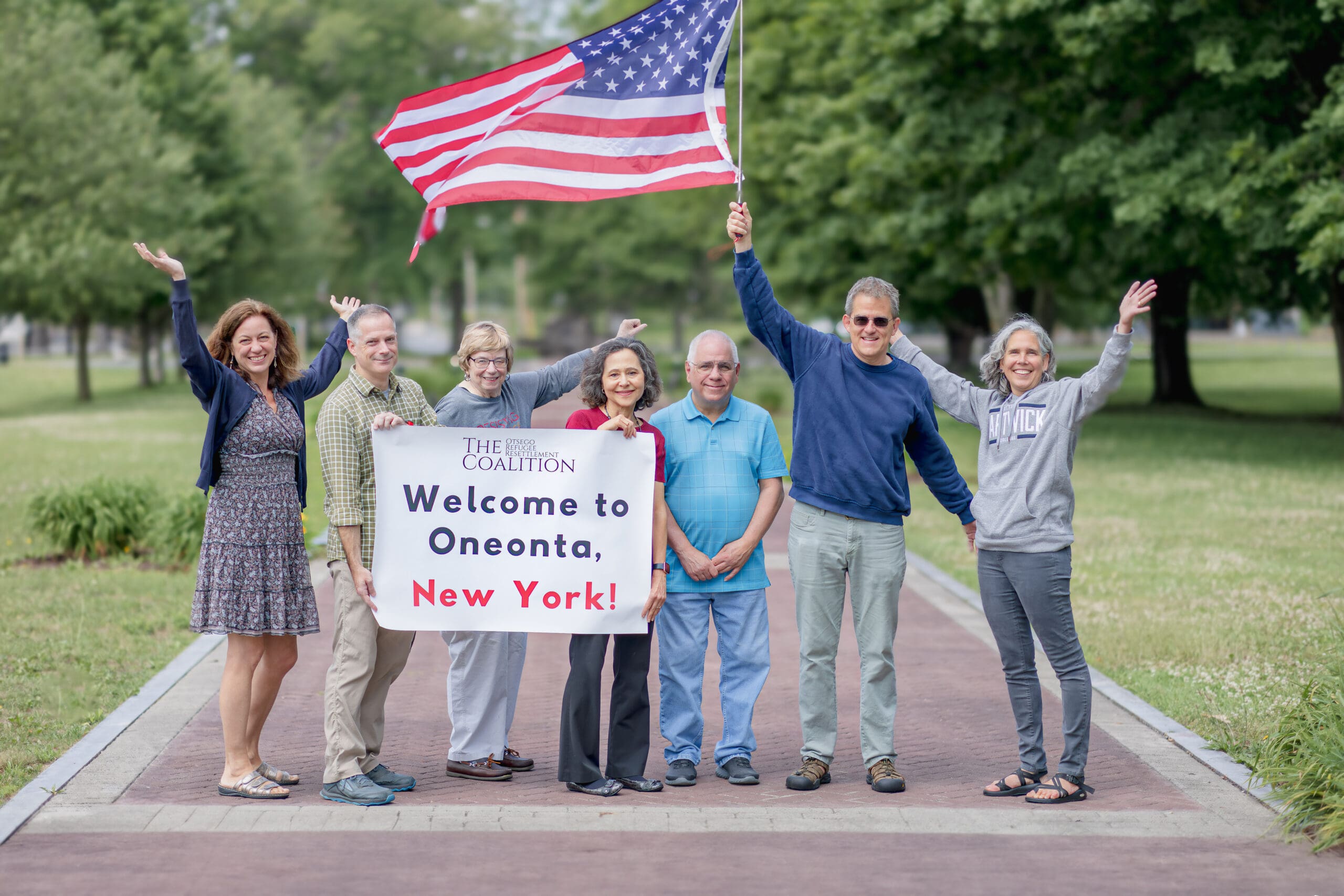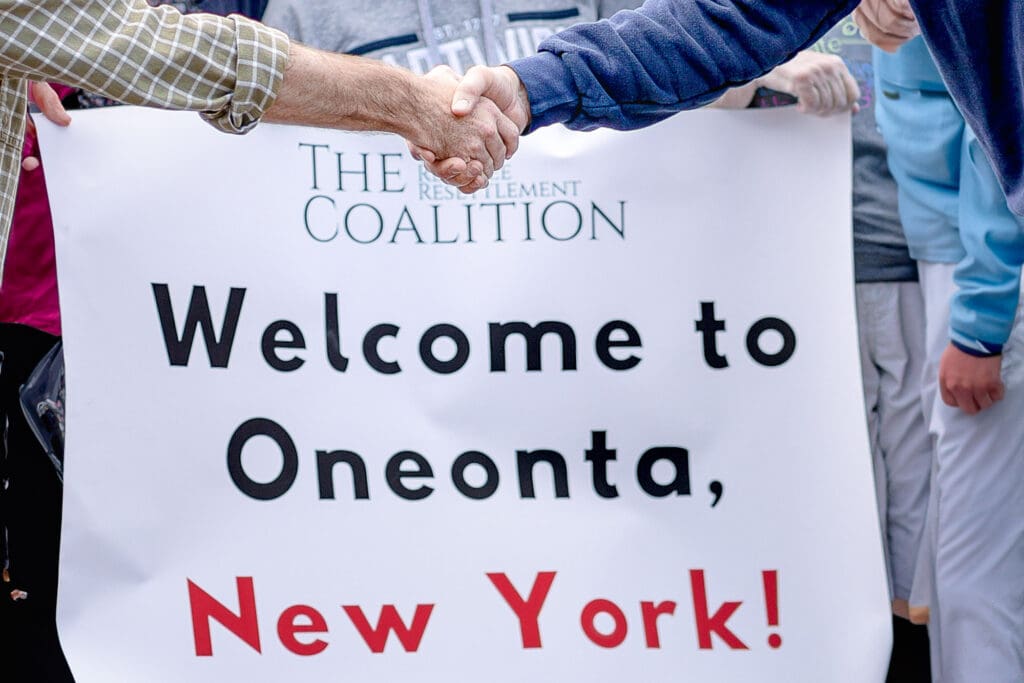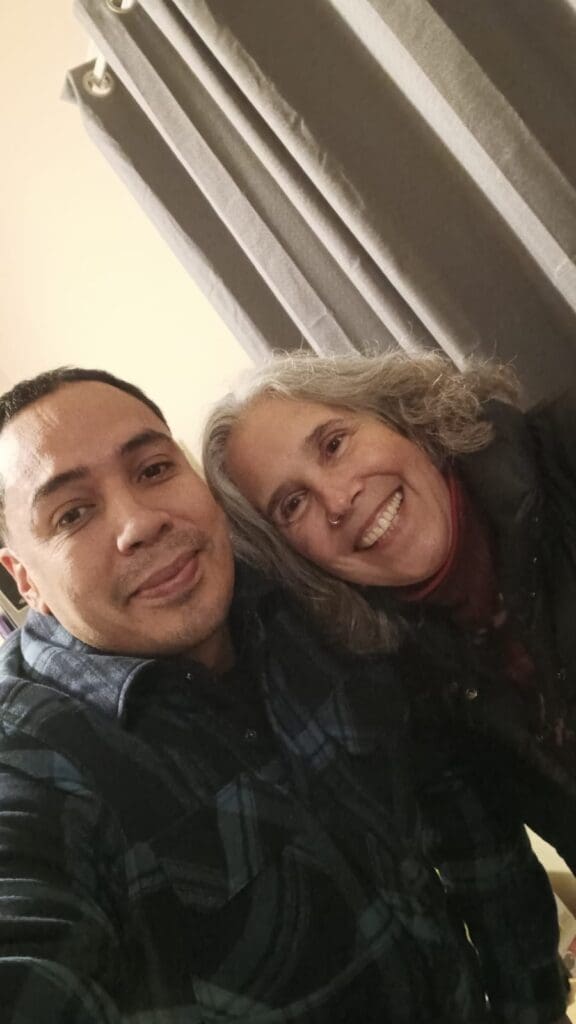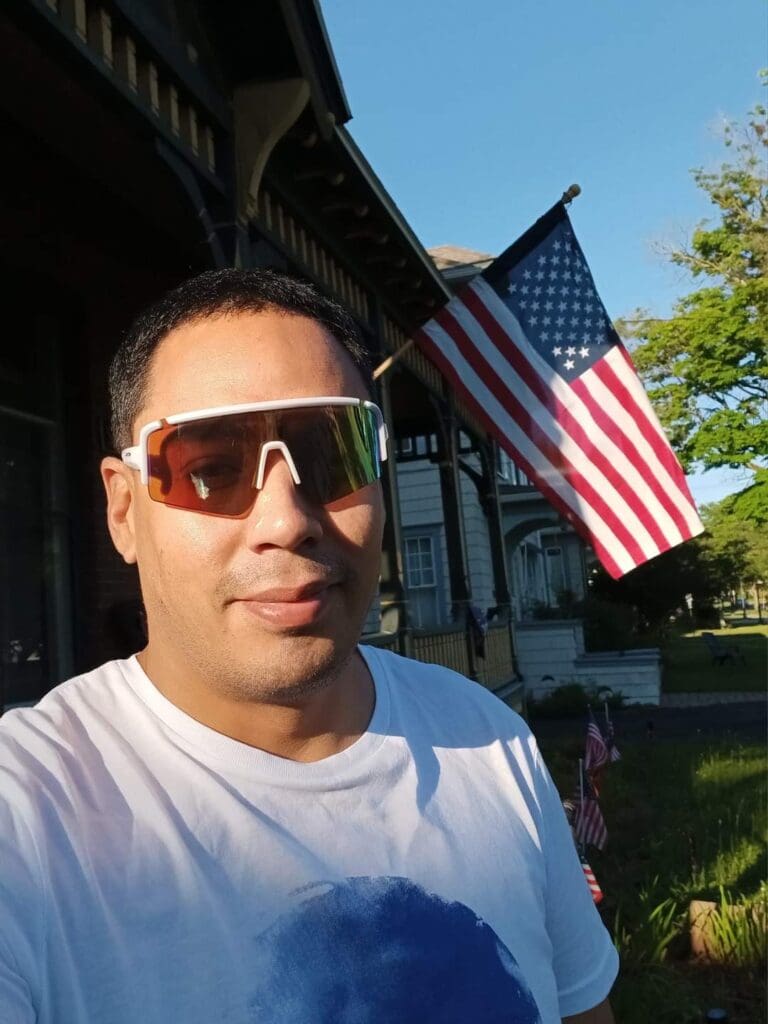
In the rural town of Oneonta, New York, the path to community sponsorship first sprang from the interest of a handful of individuals and eventually spread into a city-wide movement in support of welcoming refugees.
For Mark Wolff and other members of Otsego Refugee Resettlement Coalition (ORRC), the launch of the Welcome Corps presented a new, more direct way to make a difference in the lives of people in need around the world. ORRC was the first private sponsor group formed in New York state and among the first across the country. The coalition has welcomed refugees twice already and has applied to help resettle more newcomers, including a refugee family.
“I can’t stop what’s happening in Venezuela, or the [Democratic Republic of] Congo, or Gaza, but one thing I can do is help individuals,” said Mark, a French language professor at Hartwick College. “There’s always more that can be done, but being able to welcome people in our community is something real and tangible.”
Hopeful beginnings
The urge to help refugees had brought Mark together with likeminded community members many years before forming a sponsor group. He recalls a meeting in 2016 at his Methodist church with fellow congregants, as well as folks from the local synagogue and others involved with Catholic Charities. Together, they brainstormed ways they might help those fleeing the humanitarian crisis in Syria and other violent conflicts around the world.
Unsure of how to get started, several community members traveled 60 miles to The Center, the nearest refugee resettlement agency located in Utica, to see what they could learn. In 2017, they connected with leadership at The Center to see if they could serve as a satellite group supporting refugees arriving in upstate New York. Unfortunately, Oneonta was too far away for case workers to make the drive. The community members would need to find another way to help refugees. In the meantime, Mark volunteered at The Center to help refugees learn English.
“If you want to do more to help refugees but are afraid you can’t do it because it’s too much time and effort, you can work it out with a group. You can make it happen.”
Mark, Welcome Corps sponsor
It would be several years before the group would formally reconvene to help refugees, but those early efforts in 2016 and 2017 would prove to be an incredibly important foundation. It was thanks to those original meetings that the ORRC, once formed in 2021, was able to hit the ground running as it did.

Preparing to welcome
The Welcome Corps launch was a springboard for ORRC’s efforts to help migrants and helped bring a surge in community interest in supporting resettled refugees. The local meetings restarted and soon members were divvying up tasks between them to prepare to welcome a couple from the Congo who had fled civil war and ethnic conflict in Central Africa. One member handled finding suitable housing and the tracking of landlords open to renting to refugees, tasks that can often be difficult as refugees work to build credit history and land their first job in the United States. Meanwhile, another sponsor group member was tasked with building an inventory of local donations, including furniture and clothing.
“The community sponsorship model is really well thought out. With at least five people, the burden is not on any one person, and you can divide up the tasks,” Mark said. “If you want to do more to help refugees but are afraid you can’t do it because it’s too much time and effort, you can work it out with a group. You can make it happen.”
Helping newcomers navigate local services was the focus of Debra Marcus, one of founding members of the 2016 convenings and the sponsor group coordinator for the first refugees welcomed by the coalition. Marcus runs a family planning medical center and has used her knowledge to ensure refugees get the support they need in starting out in America. ORRC has also shared its experience with other sponsors in nearby communities, according to Debra, who mentions the coalition’s work to help other Welcome Corps groups with finding housing and medical care, as well as obtaining New York state identification cards.
Uniting around the message of welcome
The decision to form a sponsor group and make a difference in the lives of refugees was a straightforward one for the Oneonta locals who had been looking to help refugees going back to 2016. However, it was still critical to receive support from the entire community.
Debra says that ORRC approached multiple local leaders and institutions, including colleges, businesses, local reporters, faith leaders, the chamber of commerce, country representatives, and even the mayor. In a presentation for the county board, the sponsors made clear that welcoming refugees to Oneonta was not just the right thing to do–it was also for the good of the community.
Debra mentions that the population is declining in Otsego County, in which Oneonta is located, like much of upstate New York. She shares an anecdote of how her younger daughter graduated high school in a class of over 200; the graduating class only a few years later was down to 120 students.
“There’s a humanitarian motivation to help refugees foremost, but also a way to bring more people to upstate New York, where we’re losing people,” says Mark “It benefits our community in so many ways and gives us the strength of diversity.”
The case for community sponsorship and refugee resettlement proved persuasive. ORRC’s coalition has nearly 100 people on its email list, and it frequently engages with the community to send updates on how residents can help arriving refugees. According to Mark the coalition now includes Oneonta’s mayor, some of Otsego county’s elected representatives, and reporters from the local newspaper. The generosity and welcoming attitude of a small group of individuals has caught on, spreading across an entire community now seen as a beacon of hope by refugees arriving in upstate New York.
Changing lives
One such refugee is Marlon, who was welcomed by ORRC earlier this year. Marlon was forced to flee his native Venezuela after being extorted, assaulted, and having his life threatened by government-backed militant groups. Despite the differences in culture and weather between Venezuela and Oneonta, Marlon has taken to his new home with real gusto.
“I feel good in my new life. Oneonta is very calm, almost magical, and there are lots of opportunities. When you come from somewhere as dangerous and chaotic as I do, it’s a blessing to be here,” said Marlon.
“I want to give back to the community just how the community has helped me,” Marlon.
Marlon, refugee


Marlon quickly found employment, working in a restaurant during the day and as a janitor at a local school in the evenings. His English is fast improving, thanks to one of the school’s teachers, and his appreciation for Oneonta, and the United States as a whole, is ever growing. Through his day job, he’s learned to make all kinds of American fare and, in exchange, has shared some of his favorite Venezuelan dishes with coworkers. For Marlon, welcoming others the same way that ORRC and Oneonta welcomed him is now one of his main priorities.
“I want to give back to the community just how the community has helped me,” Marlon says. “I am so grateful. As a religious man, I thank God every day. I never thought that I would ever be this lucky or that I would find people so giving. It’s a miracle–that’s the only word for it.”
For sponsor group members like Debra and Mark, helping Marlon and other refugees has been a life changing experience, one that they would recommend to anyone interested in helping those most in need.
“It feels good to help,” says Debra “We live in a small community and there’s so much suffering going on in this country and around the world. We can’t change that or make a difference on a large scale, but we can make a difference here. We can effect change locally.”